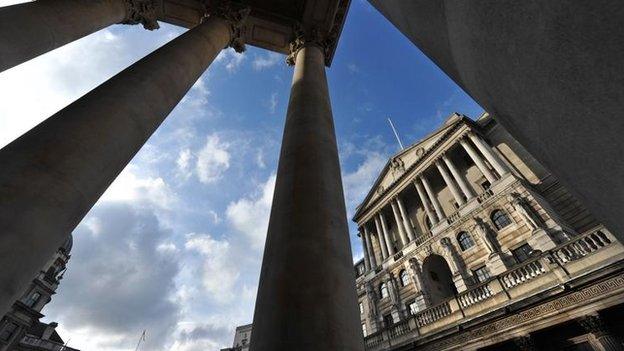Bank expects weaker recovery
- Published
- comments

The Bank of England is less optimistic about our recovery than it was in February.
It has revised in a downward direction its projections for the belated recovery in GDP, productivity (or output per hour worked) and living standards.
And what underlies not exactly pessimism but a tempering of bullishness is its new analysis that a disproportionate number of new jobs in the economy are lower skilled and less productive.
In that sense, it has reinforced Labour's concern that the revival of our economy was not doing enough to make most people richer - though, to state the obvious, a bit too late to lend credibility to Ed Miliband's campaign.
That said, earnings figures released today show an acceleration in the rise in weekly earnings, to 4.3% for the private sector in March - a rate of increase similar (at last, some would say) to earnings inflation before the Great Recession of 2008.
But (and it is a big but) austerity still seems to rule in the public sector, because pay and bonuses there actually fell 0.9%.
And these are one-month figures, which can be volatile.
That said, it shows that zero inflation has not engendered pernicious wage deflation.
So what are the striking changes in the Bank's prognostications?
Well, it has downgraded growth in GDP or national income from 2.9% this year and next, to 2.5% and 2.6% respectively.
The forecast for growth has been reduced because of the rise in the pound, which will choke off exports, a fall in housing construction, an expectation that interest rates will rise a bit earlier than thought a few weeks ago (more on this below) and also that weakening I mentioned in productivity growth.
In fact the Bank expects output per hour to rise just 0.25% this year, or so close to zero as to be almost meaningless, which is down a half percentage point compared with what it expected in February.
That said it expects a recovery in productivity to 1.25% next year and 1.75% in 2017.
There are three things to say about this belated and mild expected restoration of productivity increments.
First that rate of growth would be very disappointing compared with the pre-crisis average growth rate of 2.25%.
Second, productivity today is 16% below where it would have been if pre-crisis trends had been sustained - which is an important way of understanding the underlying damage of the crash to our prosperity.
Third the Bank may hope that there will be a belated productivity recovery but its deputy governor Ben Broadbent concedes that the "biggest single uncertainty" is the productivity outlook.
Yikes.
Which means living standards may not rise even as fast as the Bank's downgraded expectations - of a rise in real or inflation-adjusted post-tax income of 2.5% next year (compared with February's prediction of 3%).
Oh, and just to remind you of the point of all this soothsaying by the Bank, the Governor Mark Carney sees inflation rising back to the 2% target over the two-year policy horizon. That is based on market expectations that the interest rate it sets will finally rise from the current 0.5% rate to 0.75% some time between April and July next year.
So interest rates to rise in roughly a year.
You have been told.